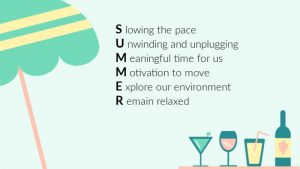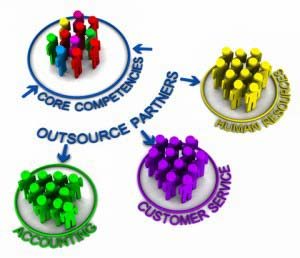Ahhh, summer…
 Summer officially arrives tomorrow, Summer Equinox and the longest day of the year. Some of us may head off to the beach or a cottage, some may be working in the heat of summer, while still others may be getting comfortable near a fan. As noted in the acrostic above, summer is an opportunity for us to do a few things to keep ourselves calm and relaxed as we unwind this summer.
Summer officially arrives tomorrow, Summer Equinox and the longest day of the year. Some of us may head off to the beach or a cottage, some may be working in the heat of summer, while still others may be getting comfortable near a fan. As noted in the acrostic above, summer is an opportunity for us to do a few things to keep ourselves calm and relaxed as we unwind this summer.
Slowing the pace
By taking the time to stop what we’re doing, or interrupt the daily cycle to listen, take a breath and live in the moment, even for just a minute, we can gain tremendous benefits such as lowering stress levels, lowering our heart rate and improving our mood and psychological engagement. Lifehack.com has a list of ways to slow down in a fast-paced world.
Unwinding and unplugging
Try going a day (or longer) with no technology, the magic of un-plugging. That means no phone, no television, no media of any kind. Instead, why not try taking a relaxing bath, read a good book (made from an ancient fibre called ‘paper’), playing music or painting, or any other activity one would consider “old school”. By taking note of how you feel at the end of the day or more with no technology and noting if you had an unwound day without it. Getting in touch with some of the old ways of doing things can make a difference in one’s day and it can actually help you feel mentally refreshed. A colleague mentioned when she needs to unwind, she bakes some bread but doesn’t use machines to make it. Just a bowl, spoon and her two hands. She swears by it as a stress reliever.
Meaningful time for us
Don’t feel guilty about taking some much-needed quality or meaningful time out just for you. How we define that time may be different for everyone. Perhaps it means to be alone to collect your thoughts without interruption, or it may mean making time for family and friends. Just remember to not feel guilty about taking that time back but if you need some convincing on why it is important to take the time for yourself, Psychology Today runs through a few reasons to not feel guilty about solitary time for you and Time.com talks about the importance of meaningful time with those around us.
Motivation to move
So far, we have talked about slowing down, unplugging, unwinding and taking time for ourselves. This all sounds pretty relaxing, but what about the importance of getting up and moving? While this almost feels counter-intuitive to the strategy of relaxing, exercise can make that relaxation all the more impactful by adjusting our body chemistry to reduce stress and boost mood, allowing us to better make use of our previously discussed methods for relaxation, as mentioned in Harvard Health. Alternatively, if the heat has got you down, taking a dip in the nearest pool or lake is another great way to stay in shape.
Explore our environment
While you’re getting up to exercise, why not take it outside. It’s summer after all! This gives you a wonderful opportunity to mindfully take in nature within your neighbourhood, or local trails. In our busy days, we don’t always get to take in the beauty of our environments.
Remain relaxed
Finally, some days just feel like chaos rests at the top of our minds. This is the perfect chance to try some meditation exercises to quiet the chaos, reduce stress and bring us back to that place where we can once again enjoy a slower pace by unwinding and making our summer a meaningful one.
Have a wonderful summer everyone!
Outsourcing : the view from here
 Outsourcing of services is becoming more and more mainstream and with the abundance of former corporate workers who have vast knowledge and experience and now run their own businesses, you will likely be able to find someone to help you for a reasonable amount of money. Just as business owners can operate from just about anywhere, resources can provide services from anywhere. But whatever your needs are, always remember: “buyer beware”!!
Outsourcing of services is becoming more and more mainstream and with the abundance of former corporate workers who have vast knowledge and experience and now run their own businesses, you will likely be able to find someone to help you for a reasonable amount of money. Just as business owners can operate from just about anywhere, resources can provide services from anywhere. But whatever your needs are, always remember: “buyer beware”!!
Here’s a few things to consider when outsourcing:
- The lowest priced outsourced solution may not be the best; good people cost money and beware that even these days, you still get what you pay for.
- If you’re just starting out, outsource from the very beginning with a Virtual Assistant and a bookkeeper and grow your team from there. As your business grows, you can take on a web designer, a ghost writer, a graphic designer, an executive assistant, a project manager, etc.
- Don’t outsource a task just because you don’t want to do it. There will be tasks that only you can do because they’re important to operations and strategic plan.
- Always strike a fair deal with your resources and treat them with respect. You’re relying on them to handle important tasks for you and your business so don’t take advantage of them.
- Bartering. This is a great way to get things done for no cost in exchange for services. Make sure that you and the resource are clear about the terms and that the services you each provide are both what you want. Beware that this mode of payment isn’t for everyone.
On the personal side of your life, you might think about outsourcing to further free up your time:
- A personal assistant to help keep you and your family organized;
- Housekeeper/house cleaning service;
- Property maintenance;
- Grocery service, errand service
When I first started my remote support agency, I thought I would lay-off my housekeeper, thinking that since I would be working from home, I could manage the house myself. A very wise business coach I met during my early networking days advised me against it. The reason? “You’re going to be at work during the day.” She was correct, of course, and my housekeeper is still with me to this day. What are your priorities? What would make your life easier and be less stressful for you? Give it some thought!
Employee Interaction in a Remote World
 One of the key questions that a remote business employer receives from clients, or those thinking of starting their own virtual business is, “How do you know your employees are getting anything done? I mean, you are paying them but, what are you getting in return?” The easy answer is ‘Outcomes and Results’, as noted in our last blog post Managing a Changing Environment.
One of the key questions that a remote business employer receives from clients, or those thinking of starting their own virtual business is, “How do you know your employees are getting anything done? I mean, you are paying them but, what are you getting in return?” The easy answer is ‘Outcomes and Results’, as noted in our last blog post Managing a Changing Environment.
On the flip side, this article tackles some of the big questions asked by some of our remote employees:
- How do I know if I am doing a good job?
- Is there more I could be doing? Am I just one software program away from being able to obtain more work?
- What are other employees for the company doing and how do we all fit together?
- How do I work collaboratively with other employees to share ideas?
- What is the big picture for the company and how is my work a part of this?
The ability to answer your remote employees’ questions helps them know where they stand in the big picture of your organization and can increase productivity.
Although much of a remote employee’s work is done using technology, clear communication goes a long way, even in these days of remote ‘everything’. Whether through email, a phone call or an in-person meeting, remote employees can accomplish a great deal by using all forms of communication and answers the questions above.
How do I know if I am doing a good job?
Employees should simply ask the question to their employer and be prepared for potential constructive criticism. Employers should be monitoring the progress of the employee’s deliverables and be ready to provide this feedback, whether positive or constructive. Consider the setting to provide this feedback. An in-person meeting may be warranted, as an email may not provide the sentiment and feeling behind such a conversation.
Is there more I could be doing? Am I just one software program away from being able to obtain more work?
Again, employees should ask the employer if there is any available work, followed up by asking what tools and experience are required to do this work. Employers should check in with their employees to see if they have an interest in taking on other work and checking to see if there has been any change in their available tools to help you with your business.
What are other employees for the company doing and how do we all fit together?
Employers may want to consider planning opportunities for all employees to get to together to share work ideas and get to know who is playing what role in the business. Additionally, employers may want to create an employee list with contact emails and identification of who is working on what files, if it is secure to do so.
How do I work collaboratively with other employees to share ideas?
Following on the last point, employees may want to take advantage of opportunities to meet with others in the organization and share ideas with the entire team. Perhaps send an email to keep in contact and consider asking your colleagues if you have a question or need help, if your employer is ok with that.
What is the big picture for the company and how is my work a part of this?
Employees should have this discussion with their employer not just at the time of hire, but every once and a while to check in. The organization may have changed or new projects started and it is important for one to know where their efforts in an organization have an impact.
These questions are just the tip of the iceberg; making communication with and between employees integral in a remote business is an important component to the relationship. So, if you’re feeling stuck, remember to just ask!
Managing a Changing Environment
 Over the past several years the physical landscape of the traditional office space has changed to evolve and promote productivity of its workers. Ergonomics assessments, increasing natural lighting and working with flexible schedules are examples of changes that have helped in this regard, but what if your employees are finding they are more productive outside of the office environment?
Over the past several years the physical landscape of the traditional office space has changed to evolve and promote productivity of its workers. Ergonomics assessments, increasing natural lighting and working with flexible schedules are examples of changes that have helped in this regard, but what if your employees are finding they are more productive outside of the office environment?
While some companies have successfully integrated the ability for workers to work from home where feasible and as shown in this Globe and Mail article,(dated 2017) some managers and leaders find it challenging to manage workers that are not located on the company’s site. Many times, there is a trust issue between management and employees or hired virtual workers that need to be dealt with to allow a successful off-site arrangement to work. These issues are as relevant today as they were when remote working was becoming more commonplace.
A common question that we hear is “How will I know if the work is being done right, or being done at all?”
The simple answer: Outcomes and Results.
The proof is in the pudding as they say. This may be accomplished by setting goals for the day, week, and month for the off-site worker to meet and if actual time worked is a concern, the worker can submit a weekly time sheet either manually, or using time tracking software online.
For the most part, when an off-site worker is trusted they may feel more invested in a company that understands the importance of working off-site and may want to have their best work shine through in those results and outcomes. So if you’re on the fence about off-site work, here are just a few benefits to this way of working:
- Your very valuable time. The day of a manager or leader can be packed,with all employees in the office valuable time is taken by “doing the rounds” to check and see what everyone is up to, but is there a value in this?
- Workers that have opted for off-site work tend to be more productive, as there may be things within the office environment they find distracting or may just work at a different pace and timeline than what has been established as the norm.
- Workers that have opted for off-site work and have been given the opportunity to do so may have greater respect for those they are working for, as they may feel they are being understood.
- Many off-site workers tend to find a better balance of their social commitments and work with less absenteeism.
- Communications with your off-site worker are as simple as picking up the phone, sending an instant message, sending an email, or starting a Skype conversation.
Remember though that remote working isn’t for everyone! Some people are their most productive working on their own in peace and quiet (like yours truly). Other people need a place to go every day and work well with interruptions and face-to-face interactions. Either way, in today’s information society it still comes down to outcomes and results however, working remotely allows for much more autonomy for the responsible human to provide the results on the due date without management knowing when the work was actually done.

Recent Comments